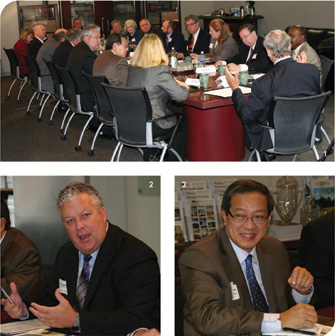
1. Nearly a score of the region’s business school deans gathered to assess the current state of their speciality. | 2. Simply put, business is ahead of academia, said Benedictine College’s Dave Geenens. | 3. The Bloch School’s Teng-Kee Tan had much to smile about after news of a $32 million donation to his school from Henry W. Bloch.
Faculty Issues
Among the challenges that several participants cited was the aging of the faculty and the need to replace them.
“That’s a Baby Boomer phenomenon,” said Myles Gartland, director of the Helzberg MBA program at Rockhurst University. Many early-generation Boomers with Ph.D.s, he explained, remained in academia and are now hitting the retirement age at roughly the same time.
Compounding that problem, said Gerald McDougall, dean of the Donald L. Harrison College of Business at Southeast Missouri State University, is the salary structure in traditional business schools. “I’ve hired assistant professors making more than full professors on my campus,” he said. Faculty members have been more patient than they might be in other departments for the reason that “they understand markets.” Still, those disparities are not easy to reconcile—or to pay for.
At Southeast Missouri and elsewhere, there is a premium for those young professors who can be effective in the classroom and still do quality research. Said McDougall, “We have to find faculty that can be productive in the classroom immediately and establish that scholarly program and maintain it.”
As Gartland explained, the accrediting body insists that 75 percent of graduate classes be taught by Ph.D.s with appropriate qualifications. This limits the traditional school’s hiring options.
Dave Geenens, executive director for Benedictine College’s MBA programs, has little use for accreditation agencies that dictate faculty composition. “From where we sit, we refuse to be wagged by the tail,” he said. On the subject of innovation, Geenens contended that business is ahead of academia. “So if you want to get on that bus,” he said, “you really need to go hire people who have been in business.”
The non-traditional graduate programs rely more heavily on adjunct faculty. Don Weiss, graduate school dean at Keller Graduate School, observed that these programs look for “the practitioner that comes into the classroom bringing that wealth of experience.” At Keller, practitioners also need a master’s degree with 18 hours in the discipline they are teaching, which makes recruitment more challenging.
Kristen Moore, campus executive for Ottawa University’s Kansas City campus, described the ideal faculty member, whether adjunct or full time, as well-qualified, relevant in teaching and research, and academically prepared, as well as effective and engaging in the classroom. Such faculty members, to be sure, are not easily found.
UMKC’s Bloch School, as Teng-Kee Tan noted, looks for young faculty with a Ph.D., teaching experience, and strong research capability. On a distinctive note, the Bloch School expects all the junior faculty members to bind to its mission of promoting entrepreneurial studies. The school encourages research especially into entrepreneurial questions and often in collaboration across disciplinary lines.
Research
A question was raised about the relevancy of the research being done by the faculty, and on this point, John Sweeney, director of accounting and information systems for the University of Kansas School of Business (and no known relation to Ingram’s Joe Sweeney), was unflinching.
“Our research is not driven by its applicability in business,” said Sweeney. “It is basic research. It’s really driven by the status of the journals that it appears in.” Sweeney hoped the research would make a difference, “but whether it does change business or not change business, our faculty are trying to publish in the top journals.”
“If you want to be a Tier I, Tier II research school,” affirmed Myles Gartland, “there’s a certain set of journals that you have to get yourself published in. And I’ll be very honest, a lot of times they are not very interested in relevancy.”